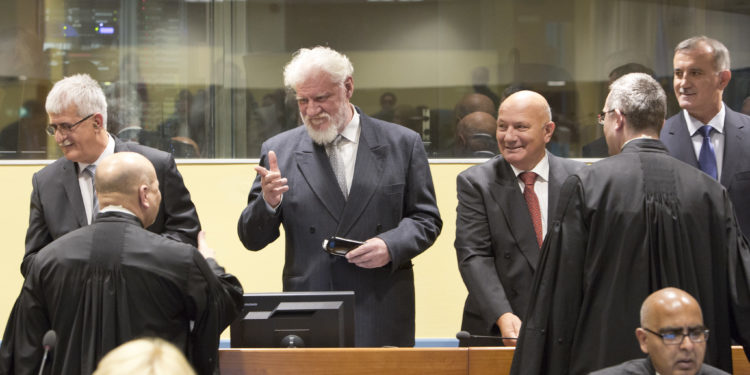There has been a dramatic incident on the very last hearing day of the International Criminal Tribunal for the former Yugoslavia (ICTY) which is going to close its doors after more than 24 years of activity: Slobodan Praljak (72) drank a glass of poison in the courtroom immediately after the Appeals Chamber had confirmed the conviction of the former Bosnian Croat general for war crimes against Muslims. He died the same afternoon in a hospital in The Hague.
Suicides occur in every prison system. Common criminals may use this last resort after a failed life, out of despair, in a normal prison. At international courts, other factors play a role: martyrdom, “heroism”, the place in the history books, people not wanting to carry labels like “genocidaire”, egos previously used to public attention – or failed attempts to contribute to reconciliation.
The first defendant to commit suicide in the detention of the ICTY was Slavko Dokmanović who killed himself in the United Nations Detention Unit in Scheveningen in June 1998. He had been tried for his alleged complicity in the killing of hundreds of patients at a Vukovar hospital in 1991. The former mayor of the Croatian town committed suicide a few weeks before the judgement. People who knew him suggest he could not bear the shame of possibly being the first suspect to be found guilty of crimes against humanity by the ICTY.
Milan Babić, a former president of the separatist Serb republic within Croatia, committed suicide in his ICTY cell in March 2006. He had been giving evidence as a prosecution witness in two trials at the ICTY, among which the case against former Serb president Slobodan Milošević, the tribunal’s highest ranking suspect, as he was also head of state of Yugoslavia. According to his defence lawyer, he acted in despair, because he had hoped in vain that his testimony and confession of his own crimes before the UN judges would contribute to reconciliation between ethnic Serbs and Croats.
Speculation was rife in The Hague on Wednesday that Praljak may have committed his Socrates-style suicide because he wanted to secure a martyr’s place in the Croatian history books. During the war in Bosnia from 1992 till 1995 he was fighting against the majority Muslims in Bosnia to make sure that the areas inhabited by ethnic Croats could join their next of kin in neighbouring Croatia.
Reuters news agency reports from Mostar, a town emblematic for the fight between ethnic Croats and Muslims in Bosnia: “About a thousand Bosnian Croats gathered in a Mostar square late on Wednesday to light candles in support of Praljak. A mass in his honor was held in a packed Catholic cathedral, where churchgoers draped themselves in Croatian flags.”
Praljak, whose 20 year prison sentence was confirmed on appeal, had been in ICTY detention since April 2004. He would have been eligible for early release very soon, as it is current UN practice after two thirds of the sentence served.
The suicide is not officially confirmed yet, pending the results of an inquiry by the Dutch police. ICTY has released an official statement confirming Praljak’s death.







